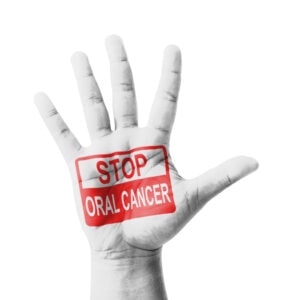
Oral Cancer Signs & Symptoms
The hard part about diagnosing oral cancer often comes from the fact that some of the early signs of oral cancer can easily be confused with other oral health conditions. However, it’s always better to be safe than sorry, so if any of the signs and symptoms below don’t go away within 2-3 weeks, we recommend scheduling an appointment with your dentist in Canton as soon as you can.
Check Your Mouth
While regular checkups with your dentist are certainly important, there are things you can do at home to proactively check for early signs of oral cancer or other symptoms of tooth trouble. Keep an eye out for any new tooth sensitivity, bleeding, or sores in the mouth. Additionally, check in with the Check Your Mouth initiative to help you identify potential abnormalities in the mouth.
Oral Cancer Risk Factors
Even though oral cancer can happen to anyone at any time, there are some things you can do to lower your risk of developing this serious and sometimes deadly disease. Keep in mind that some factors are genetic, but others can be controlled.
Oral cancer is a tricky thing, and the best way to protect yourself against it is to see your dentist in Canton twice a year. Like many oral health problems, oral cancer is best and most successfully treated when it’s caught early.
Welcoming new patients at our dental offices in Ann Arbor, Canton, Farmington Hills, and Livonia.

Stress & Oral Health
Many times, the effects of stress are simplified to include only things like increased anxiety levels, eating habits, headaches, and stomachaches. But it’s also common for signs of stress to first show up as symptoms that affect your oral health. In fact, stress can affect oral health in numerous ways.
While jaw pain could indicate a variety of problems, stress is often at the top of the list. When we’re stressed, especially over a long period of time, our bodies tend to react in a variety of ways. One of those ways is to start clenching or grinding our teeth together. Oftentimes this is done without us even knowing it’s happening, such as during sleep. This results in constant pressure on the jaw joint, making the muscles sore which could eventually cause TMJ disorder or TMD. TMD is painful, and some common signs are the popping or clicking of a jaw, a locked joint, or generalized jaw pain. If you have jaw pain that you can’t explain, talk to your dentist in Ann Arbor.
Many people think that it’s normal for gums to bleed after brushing or flossing. However, bleeding gums at any time should be cause for concern. Bleeding gums is a tell-tale sign of gum disease, but there’s a common misconception related to gum disease. Many people think that gum disease is automatically a result of poor dental hygiene. But the truth is, several other things can increase the risk of gum disease, including smoking, certain medications, clenching or grinding your teeth, and yes, stress. When we experience too much stress, our immune system often becomes worn down. This can allow bad bacteria in the mouth to flourish, causing an infection and leading to gum disease. Gum disease can cause tooth loss, and heart disease, and increase the risk of stroke.
Sores in the mouth, such as canker sores, can be triggered by a vitamin B deficiency or a variety of injuries or irritations. Research also supports the theory that mouth sores can appear during periods of increased stress. Mouth sores that should warrant a visit to your dentist in Ann Arbor include those that appear as white or red ulcers that last longer than two weeks.
Reducing Stress Can Benefit Oral Health
We can’t completely avoid stress in our lives but can do things to manage stress in order to live happier lives and protect ourselves against the negative side effects of too much of it. Some ways to lower stress and therefore the effects of stress, include:
Stress is a natural part of life, and certain amounts of it can actually be beneficial. But too much can cause problems in oral and overall health. During this Stress Awareness Month, focus on your stress levels and how they may contribute to your overall health.
Welcoming new patients at all of our dental offices in Ann Arbor, Canton, Farmington Hills, and Livonia.

How Foods Affect Oral Health
Everything we eat can impact oral health. There are some foods that are great for teeth, and some that can cause problems.
What to Avoid
Best Types of Food for Teeth
Finding the Best Food for You
Nutrition can be complicated. The United States Department of Agriculture (USDA) tried to help us out by introducing the Food Guide Pyramid in 1992 to show us how much of each food group we should strive to eat every day. But the truth is, nutritional needs are individual, and not all of us need the same things in the same quantities. Things like age, gender, height, weight, activity level, and underlying health concerns can make your ideal combination of foods different from someone else. The best way to find out your nutritional needs is to go to MyPlate and customize the best mix of dietary recommendations for you.
Do your part this month, and all year around, to commit to eating better to keep your mouth and body healthy. And, of course, make sure to see your dentist in Livonia at least twice a year for dental cleanings and exams.
We have dental offices in Ann Arbor, Canton, Farmington Hills, and Livonia to best serve our neighbors.

Green Mouth
The dye used to turn beer green can also temporarily turn your mouth and teeth green. This may be fun during St. Paddy’s Day but could be odd at any other time. This is why it’s a good thing that any green staining can usually be removed by brushing your teeth. Whitening toothpaste is often the best choice as they contain abrasive properties that can more effectively scrub away stains. Keep in mind that starting celebrations with clean teeth can help reduce stain severity. Areas of plaque or tartar buildup will attract and retain dying agents faster and more severely than clean teeth, much like disclosing plaque rinses show kids areas of their teeth they didn’t clean so well.
However, it’s not only green beer that can cause tooth discoloration. In fact, drinking any type of alcohol excessively can cause tooth staining and make teeth look yellow or brown. These stains tend to be more difficult to remove and may need to be treated with a professional tooth whitening treatment or other forms of cosmetic dentistry from your Canton dentist such as veneers.
Weakened Teeth
The strongest material in your body is your tooth enamel, but that doesn’t mean it can’t be damaged. Acid is usually the culprit behind damaged tooth enamel, and a lot of things we eat and drink are acidic, including beer and other alcoholic beverages. The acidity of these foods and drinks can easily erode enamel and leave teeth at risk for decay, sensitivity, and discoloration. Weakened tooth enamel may be noticed if teeth look gray, dull, or translucent.
Enjoy Your Beer, Protect Your Teeth
Enjoying alcoholic beverages in moderation greatly reduces your risk of any alcohol-related oral health problems. But besides limiting your alcohol intake, there are other ways you can further protect your smile including:
Whether you’re due for a dental checkup or are looking for the best way to whiten your teeth, we’re always happy to see new patients. We have offices in Ann Arbor, Canton, Farmington Hills, and Livonia. Call us to schedule an appointment today.

Research Links Gum Disease to Colon Cancer
This study monitored the health of over 40,000 American men and women over the course of several decades. Researchers observed the health, diet, and colonoscopy results of the participants in order to determine if there was a potential link between gum disease and colon cancer.
During the study, scientists focused on two particular types of intestinal lesions that often precede colon cancer — serrated polyps and conventional adenomas — as well as participants’ history of gum disease. They found that those patients who had a history of gum disease also had:
While the results did support the theory that gum disease could potentially lead to colon cancer, researchers say additional studies are needed to further back up these findings.
Signs of Gum Disease
One of the trickier parts of gum disease is catching it early. After all, early diagnosis and treatment can make all the difference between reversing gum disease and it reaching the point where it can no longer be cured, increasing the chance for it to affect the rest of the body. Keep an eye out for some of the common signs of gum disease such as:
It’s important to call your dentist in Ann Arbor and schedule an appointment if you recognize any of these signs of gum disease.
Lower the Risk of Gum Disease
Certain factors that can contribute to the development of gum disease are unavoidable, such as age and genetics. But other lifestyle habits that we can control can also increase the risk. Follow these tips from your dentist in Ann Arbor to reduce the likelihood of developing gum disease:
Even though gum disease may seem minor, it’s not something to take lightly. Continue to monitor any changes in your mouth and see your dentist regularly in order to catch problems early, before they have a chance to become bigger concerns and cause health problems.
We have dental offices in Ann Arbor, Canton, Farmington Hills, and Livonia. Call the one closest to you to schedule an appointment.

Dental Implant Surgery
A dental implant is one of, if not the best, ways to replace a missing tooth. Implants can even replace multiple teeth in order to avoid wearing dentures or a bridge. Dental implants are a permanent tooth replacement option so there is no need for removal, soaking, or worrying about slippage. But the treatment itself can cause concern, so let’s take a closer look at the surgery itself.
Before an implant can be placed the area needs to be fully prepped. This can mean different things for different people. If you’re already missing a tooth, there is no need for an extraction. But if a tooth isn’t healthy, it may need to be extracted by your dentist in Livonia first. Additionally, patients may sometimes need a bone graft to prepare the jaw bone and make it stronger for the actual implant placement.
There are actually a few pieces and parts to a dental implant. The first part is the implant post which is metal and screw-like. This post is placed into a drilled hole in the jawbone and acts as an artificial tooth root. Once the post is placed, it will need time to integrate into the jawbone. This healing period can take a few months but it’s absolutely necessary in order to ensure a stable implant.
Once the post is fully integrated and fused into the jaw bone, your dentist will attach an abutment and then a crown on top of it. Crowns are custom made in size, shape, and color to look like a natural tooth so the restoration blends into the smile. The final result is a permanent, complete, natural-looking smile.
Dental Implant Pain
Now that we know a little more about what’s involved with getting a dental implant, let’s take a deeper look into how much pain is involved. Since dental implant treatment is in fact a surgery, patients should expect some level of pain, but it’s probably not as bad as you think. Patients shouldn’t experience any pain during the actual post placement, but they may have some discomfort for the next 10 days after surgery. If pain lasts more than 10 days, call your dentist. Excessive pain after 10 days may be a sign of an infection so it’s important to see your dentist sooner rather than later.
Dental implants are often considered the superior tooth replacement option. So if you are missing teeth or at risk for losing teeth, talk to your dentist in Livonia about whether or not dental implants may be the best choice for you.
We’re always accepting new patients at all of our dental offices in Ann Arbor, Canton, Farmington Hills, and Livonia.

While you head online and search for “dentist near me,” one of the easiest ways to quickly narrow your search is to talk to those around you. Ask friends, family, neighbors, or coworkers about their dentists to easily generate a short list of choices.
After you get a few recommendations, head online to read reviews of dentists in Farmington Hills . Online reviews are a great way to get an understanding of the general feelings about the level of dental care, personality of the team, and pros and cons.
Patients who are particularly interested in advanced dental care such as cosmetic dentistry or dental implants should check out dentists’ previous work. Many dentists will feature before and after photos on their websites so you can get an idea of their level of care.
Some dental offices offer most services under one roof while others have a particular focus in specific areas. Depending on your individual needs, you will want to look into the types of services offered at different offices. Also consider their technology and how it can help make dental care easier.
The best way to get a feel for a dentist and their team is to visit them in person. An initial visit or consultation will give you a sense of the office environment and personality. While patients may prioritize different things, it’s always important that you feel the office is clean and that you’re being listened to and respected.
While it may seem like a daunting task, taking some time to get to know your options when it comes to choosing the best dentist in Farmington Hills can benefit you in the long run. Start by making a list of the things that matter to you the most when it comes to selecting a dentist, then get to work researching dentists in your area. Keep in mind, the more comfortable you are with your dentist, the more likely you are to keep up with regular appointments. Seeing your dentist at least twice a year is crucial to maintaining good oral health and can keep dental problems away.
Accepting new patients at our dental offices in Ann Arbor, Canton, Farmington Hills, and Livonia.

Smile Whitening in Canton
If you’re looking to whiten your teeth quickly, turn to your dentist. Professional smile whitening treatments can brighten teeth by several shades in as little as an hour. This procedure is done in the comfort of a dental office and is monitored by a member of the dental team to make sure each tooth is treated and the results are working as expected. Additionally, professional whitening can help keep whitening solution off the gums and eliminate the chance of a reaction and steps can be taken to reduce unwanted side effects such as tooth sensitivity.
Whitening Strips
While whitening strips are cheaper than professional in-office whitening treatments, they do take time to work, and some products are better than others. Whitening strips, and even most over-the-counter whitening trays, can start to show changes in 3-4 days but can take up to 12 days for them to show their final result.
Gel & UV Lights
A fairly new product to hit the smile whitening market is a combination product consisting of a whitening gel solution which is activated by a UV light. This tooth whitening treatment is pretty comparable to whitening strips or trays in terms of cost and effectiveness. Teeth should start to brighten in about 10-14 days if used as directed.
Remember, it’s important to follow all directions when using any type of smile whitening product to reduce the risk of side effects such as tooth sensitivity.
Cosmetic Dentistry
Not all types of tooth staining can be removed through smile whitening. It’s important to talk with your dentist in Canton prior to starting any whitening treatments to make sure your teeth are healthy enough and that the product you choose will work. If you find out that your tooth discoloration can’t be transformed by whitening products, cosmetic dentistry can help. One of the most common forms of cosmetic dentistry used to whiten teeth are dental veneers which can essentially cover up any imperfections you don’t like, including color.
Everyone deserves to have a smile they’re proud of. So if you’re considering whitening your teeth, schedule a visit with your dentist today to begin your journey to a brighter, whiter smile.
We have dental offices in Ann Arbor, Canton, Farmington Hills, and Livonia.

“Brush, Floss, Smile!”
This year’s slogan is Brush, Floss, Smile! helps both kids and caregivers learn just how important it is for kids to brush their teeth regularly as well as floss in between each and every tooth. To help, ADA has put together fun, interactive games and activities to make learning about dental care fun for kids. Head on over the ADA website and download all sorts of free educational tools including coloring sheets, crossword puzzles, and a calendar to keep track of brushing habits.
How Should Kids Brush & Floss?
Brushing and flossing tiny teeth are important, but your dentist in Ann Arbor will also encourage you to make sure your little ones are doing them correctly. Developing proper technique and a solid routine will help children throughout their lives..
Proper Brushing
Kids and adults should brush their teeth twice a day, once when you wake up in the morning and once before bed at night. Use the following techniques:
A thorough brushing should take about two minutes. Don’t shy away from humming songs or finding two-minute brushing videos to turn a habit into a fun activity.
Proper Flossing
It’s just as important for kids to floss once a day as it is for adults, and little ones should start flossing whenever they have two teeth that touch each other. But like brushing, flossing requires a specific technique, and it can be hard for kids. The best way to floss is gently wiggle the floss in between each tooth and curve it up under the gums. You can try traditional floss but you may have more success with a floss pick.
While brushing and flossing are crucial for all smiles, maintaining visits to your dentist in Ann Arbor is also necessary. Schedule an appointment today!
We have dental offices in Ann Arbor, Canton, Farmington Hills, and Livonia.

Tooth Sensitivity
One of the most common signs of tooth decay is new or more severe tooth sensitivity. While tooth sensitivity can occur when you’re eating or drinking something hot or cold without a cavity, extreme zings of pain after enjoying something hot or cold may be a sign of decay. Additionally, another sign of a cavity is if you experience tooth sensitivity after eating a sweet, sugary treat. Why? Well, when tooth enamel is weakened by decay, it can expose the tooth roots to things that cause pain – such as heat, cold, and sweets.
Tooth Discoloration
While tooth discoloration can be caused by any number of things, discoloration may also be a sign of decay. Usually, when we think of tooth decay, we think of dark spots, but a cavity can also start as a new white spot. Over time, the area may start to become darker, and that’s a sign that it’s time to see your dentist in Canton. As with all dental problems, decay can become serious quickly, so it’s important to keep an eye on your teeth to look for any changes in color and schedule an appointment with your dentist if you suspect decay.
Tooth Pitting
Cavities are essentially holes in the teeth where decay has worn away enamel. Even though some cavities can be seen or felt by searching for new areas of pitting, many times these pits or holes are so tiny that they can’t be seen with the naked eye. However, your dentist in Canton has special tools and techniques that can spot a pit easily, even if it’s super tiny. In fact, the smaller the pitting the less severe the cavity is, so it’s ultimately a good thing if you can’t see or feel it. Now, if you do see a new pit or hole in your tooth, it’s important to schedule an appointment with your dentist sooner rather than later. After all, early treatment often means easier treatment and reduces the chance of a cavity-causing bigger issues.
The best way to protect yourself from getting cavities is to make sure to brush and floss regularly and see your dentist at least twice a year. Not only will you get a thorough, gentle cleaning at these visits, but they’re also a great way for your dentist to check for any early signs of decay.
Welcoming new patients at our dental offices in Ann Arbor, Canton, Farmington Hills, and Livonia.